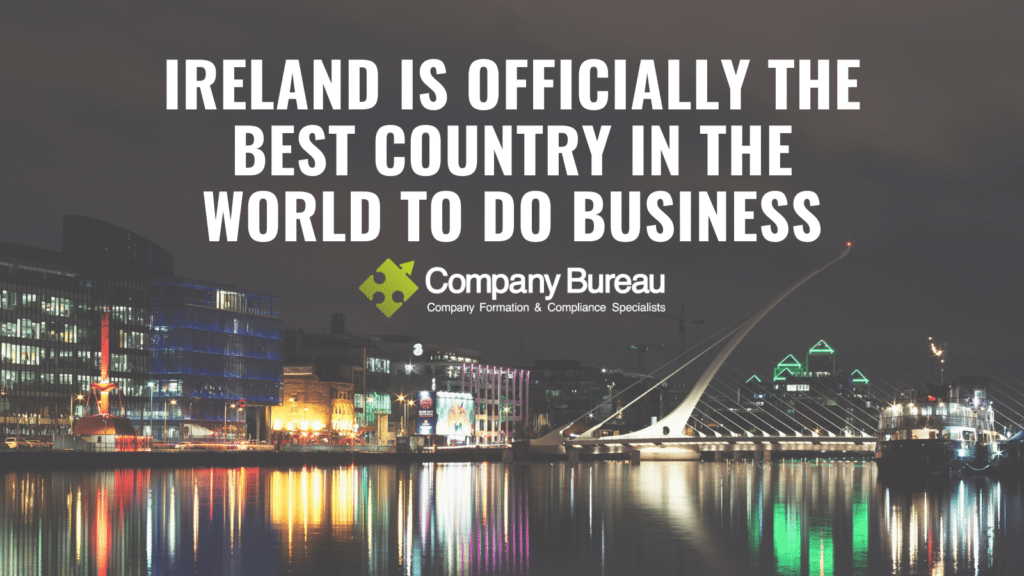Blog
Ireland is officially the best country in the world to do business, according to Forbes Magazine
by Andrew Lambe, Commercial Director of Company Bureau. 5th December 2013
Ireland was yesterday named as the best country in the world to do business for the first time by Forbes Magazine. Whilst Ireland has come out as the top EU country before, this was the first time it has topped the international charts and emphasises the attractiveness of Ireland as the number 1 jurisdiction in Europe to register a company and establish a low tax corporate entity.
“Today’s finding by Forbes that we are the best country in the world for business is above all a testament to the hard work and innovation of our businesses and workers,” he said,” Ireland’s Jobs Minister, Richard Bruton.
The country scored very high on all the main indicators including business taxes (Ireland corporate tax rate is just 12.5%), ease of set up a business in Ireland, monetary freedom and corruption. It was also noted that Ireland’s labour costs have decreased by 17% from 2008 to 2011. Labour costs have increased marginally in the EU as a whole over the same period. As well as this, employer social security taxes in Ireland are very low by international standards. Pay Related Social Insurance (PRSI) for employers has a top rate of just 10.75%, which is 5 times less than some European countries such as France and Slovenia. A 44% return for the Irish Stock Exchange Overall Index in the 12 months to 20th November also helped Ireland up the league table.
Forbes said there are now over 1,000 overseas companies that do business in Ireland, adding that the country also serves as the European headquarters for a number of US firms, including Google, Twitter and Facebook, which has resulted in an area of Dublin to become known as the ‘Silicon Docks’. Twitter opened new Dublin offices in September where it employs 100 people with plans to double in size over the next 12 months. Many small technology companies from the US (as well as other countries) have also chosen Ireland as their gateway into the European market.
“Ireland has continued to attract direct foreign investment despite its problems,” says Melanie Bowler, a Moody’s Analytics’ economist focused on Ireland. Bowler highlights the educated workforce and 12.5% corporate tax rate—one of the lowest in Europe—as big draws for companies, as well as the language factor. “You want to have a common language if you are setting up operations in Europe,” she says. The American Chamber of Commerce Ireland released a report back in October that shows U.S. companies invested $129.5 billion in Ireland between 2008 and 2012. It represented a bigger total than had been invested in the previous 58 years combined. Ireland was the fourth-largest recipient of U.S. foreign direct investment last year and attracted nearly as much U.S. investment as all of developing Asia. “Dublin has already established itself as a location for multinationals, so it has the necessary infrastructure for other companies to easily move into the country and set up a business in Ireland,” says Bowler.
Whilst Ireland has come under some pressure from France and Germany in relation to its headline corporate tax rate, the Irish Government have said on numerous occasions that this will not change and that the 12.5% rate is a ‘cornerstone of economic policy’. Whilst there is an international push to reduce tax avoidance by multinationals, this will not impact Ireland or the use of Irish companies significantly due to the open and transparent nature of its tax system. The Irish Government have also reminded critics that Ireland is legally entitled to keep its low tax rate, and the European Commission and IMF have acknowledged this.
For more information on how to set up a business in Ireland, and avail of the numerous benefits of Irish companies, please don’t hesitate to contact Andrew Lambe on +353 1 6461625 or use our contact form. Company Bureau can incorporate a company in Ireland for you in just 2-3 working days.
Disclaimer This article is for guidance purposes only. It does not constitute legal or professional advice. No liability is accepted by Company Bureau for any action taken or not taken in reliance on the information set out in this article. Professional or legal advice should be obtained before taking or refraining from any action as a result of this article. Any and all information is subject to change.


